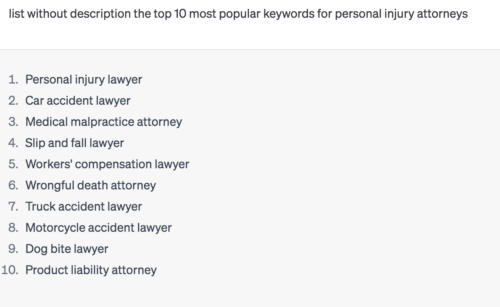
Using ChatGPT for Keyword Research
ChatGPT is a powerful research tool that can speed up many processes. Many digital marketers are using the platform in creative ways to make their jobs easier. Keyword research for law firm SEO is one such area. While ChatGPT shouldn’t replace traditional keyword tools or tactics, it can be a helpful supplement – leading to better results, faster.
Prompts to Use in ChatGPT for Keyword Research
The inputs are what really drive the content you get on ChatGPT. Therefore, the prompts are one of the most crucial elements of using AI tools. Our experts say these prompts can be used for any topic, even subjects that you’re less familiar with. Here are some of the most valuable prompts for ChatGPT:
- What are the [X] most popular sub-topics related to [topic]?
- What are the [X] most popular sub-topics related to [sub-topic]?
- List without description the top [X] most popular keywords for [topic].
- List without description the top [X] most popular long-tail keywords for [topic].
- List without description the top semantically related keywords and entities for the topic [X]
Pro tip: Once you’ve experimented with the tool and entered a variety of prompts, you’ll probably find a combination that is really effective. Then, you can add them all in one prompt. You’ll need to tell ChatGPT to follow the prompts in the right order. Begin with this text: “Perform the following steps in a consecutive order Step 1, Step 2, Step 3, Step 4, and Step 5”. Then order the prompts above with numbers to direct the tool.
You can even take things a step further and document the most common questions on the topic, which can be really helpful for generating keywords. Start by listing the numbered steps above, and then add: “Based on the above Steps 1,2,3 suggest a final list of questions avoiding duplicates or semantically similar questions.”
Another method is similar to using autocomplete on Google (when you begin to type and the results populate automatically). You can do the same on ChatGPT. An example prompt would be “give me popular keywords that include the keyword [topic], and the next letter of the word starts with a”. Again, you can combine steps into one prompt to save time. Try entering: “Give me five popular keywords that include [topic] in the word, and the following letter starts with a. Once the answer has been done, move on to giving five more popular keywords that include [topic] for each letter of the alphabet b to z.” This will generate an extensive list with five relevant words for each letter.
One unique way to use ChatGPT for keyword research is to base prompts on user personas. This will help you gain a better understanding of user personas, which is helpful for creating relevant and targeted content. Try entering the following: “For the topic of [topic] list 10 keywords each for the different types of user personas”. Consider taking things a step further by asking for questions based on the specific topics that different user personas might be looking for.
Finally, have the tool organize the words you’ve reviewed into a table: “For each question listed above for each persona, list the keywords, as well as the long-tail keywords to target, and put them in a table”.
Understanding Searcher Intent
The first step in effective keyword research is understanding the terms your user personas may be looking for. From there, you have to understand the search intent behind those keywords and which content format may work best. These terms are partially dependent on where people are in the research stage. Someone who has just become familiar with a topic will have a different searcher intent than someone who is trying to do deeper research. It’s important to include prompts that generate keywords that apply to different navigational stages.
Keyword Categorization Using ChatGPT
One of the most powerful ways to use AI tools is to assist with the tedious and manual processes that must be completed. Keyword research is no different. It’s typically part of the keyword research process to put everything into a spreadsheet that is alphabetized and allows for entering other information. If you’ve already done some research and have a list of keywords prepared, use ChatGPT to organize them. Try this: “Filter the below list of keywords into categories, target persona, searcher intent, search volume and add information to a six-column table: List of keywords – [LIST OF KEYWORDS], Keyword Search Volume [SEARCH VOLUMES] and Keyword Difficulties [KEYWORD DIFFICULTIES].”
Takeaway:
You’re likely to find ChatGPT is a valuable resource for your keyword research. However, it shouldn’t be your only resource. ChatGPT can give you endless ideas and help you organize your work, but you shouldn’t count on the tool to be as accurate as other SEO tools that you’ve come to rely on. Don’t blindly trust the information that you obtain on the ChatGPT, but it’s a great starting point. For advice on all aspects of SEO, reach out to our experts. Start with our free SEO audit, which will provide valuable insights that can help you to improve your site ranking.
Are you ready to get started generating new, qualified leads?
Contact us to get started and let us help you energize your digital marketing and business development efforts.
Contact Us


